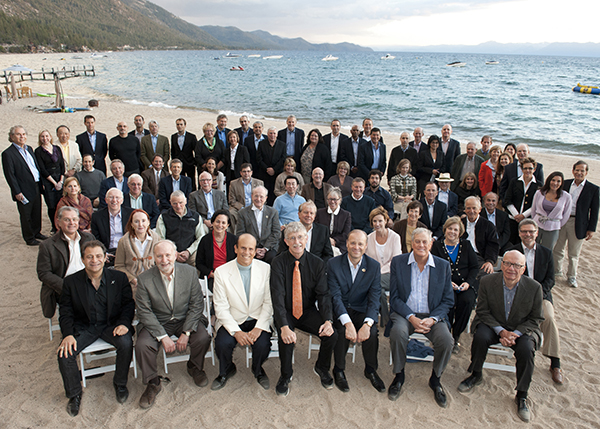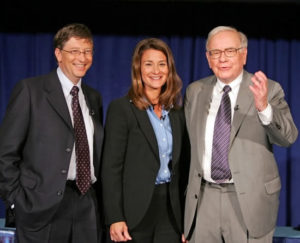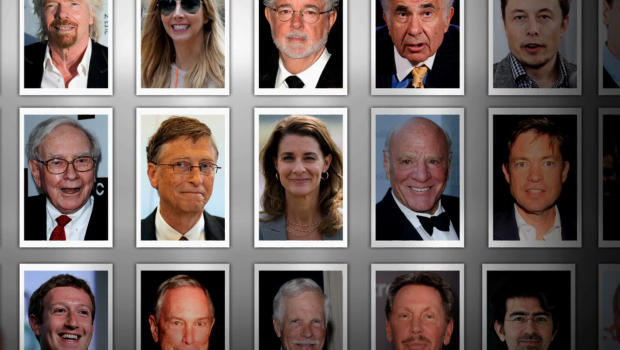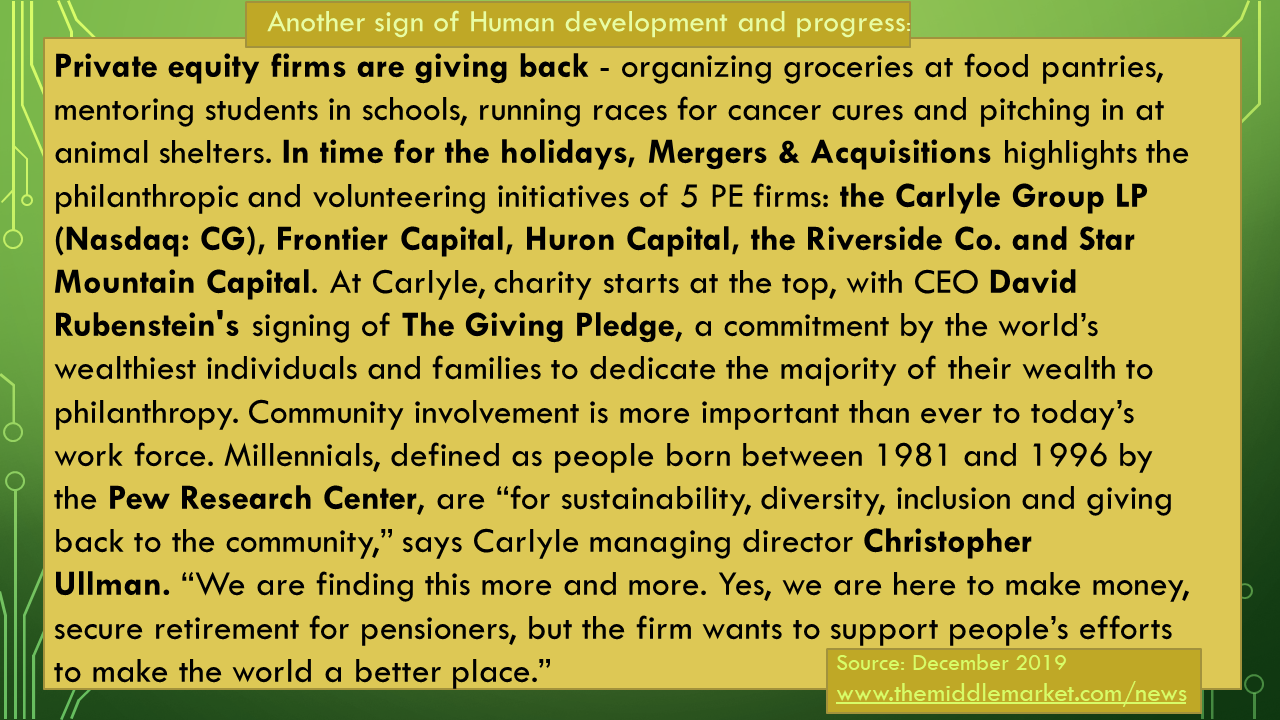“The admired ones” in paradise, MOKARRAMIN مکرمین, in Quran is reserved for those who have done the most in giving to poor (انفاق), “those who even after paying their taxes to the poor (Zakat), still do not consider part of their wealth as their own & spend it in taking care of the poor”. Second Good Deed is forgiveness.

GIVING PLEDGE is the largest act of charity in our time, maybe the largest in human history.
It is a campaign, started by Bill & Melinda Gates foundation, joined by Warren Buffet, to encourage extremely wealthy people to contribute a majority of their wealth to philanthropic causes.
As of May 2019, the pledge has 204 signatories, either individuals or couples, from 22 countries.
Most of the signatories of the pledge are billionaires, and their pledges total over $500 billion.
Pledge is for any poverty elivation cause, not dictating any certain way or towards any particular charity or cause.

Psalm 11:7
The Lord is righteous and loves good deeds; those who do them will live in his presence.

Quran 11:23
إِنَّ الَّذِينَ آمَنُوا وَعَمِلُوا الصَّالِحَاتِ وَأَخْبَتُوا إِلَى رَبِّهِمْ أُولَئِكَ أَصْحَابُ الْجَنَّةِ هُمْ فِيهَا خَالِدُونَ
Whereas those who believe and do good deeds and humble themselves before their Lord, they are the companions of Paradise, and there they shall live for ever.
Quran 2:82
وَالَّذِينَ آمَنُوا وَعَمِلُوا الصَّالِحَاتِ أُولَئِكَ أَصْحَابُ الْجَنَّةِ هُمْ فِيهَا خَالِدُونَ
But those who believe (God & resurrection) and do good deeds are the people of Paradise; for ever they shall live in it.
Quran 18:30
إِنَّ الَّذِينَ آمَنُوا وَعَمِلُوا الصَّالِحَاتِ إِنَّا لَا نُضِيعُ أَجْرَ مَنْ أَحْسَنَ عَمَلًا
Surely those believers should know that We do not neglect the rewards of those who do good deeds.
Quran 29:7
وَالَّذِينَ آمَنُوا وَعَمِلُوا الصَّالِحَاتِ لَنُكَفِّرَنَّ عَنْهُمْ سَيِّئَاتِهِمْ وَلَنَجْزِيَنَّهُمْ أَحْسَنَ الَّذِي كَانُوا يَعْمَلُونَ
As for those who believe and do good works, We shall acquit them of their sins, and recompense them with the best for what they were doing.
Quran 17:9
إِنَّ هَذَا الْقُرْآنَ يَهْدِي لِلَّتِي هِيَ أَقْوَمُ وَيُبَشِّرُ الْمُؤْمِنِينَ الَّذِينَ يَعْمَلُونَ الصَّالِحَاتِ أَنَّ لَهُمْ أَجْرًا كَبِيرًا
For sure, this Quran guides to the most stable way and it gives good news to the believers who do good deeds that they shall have a magnificent reward.
The Torah manner of giving charity.
An excerpt from Rabbi Kaplan’s Handbook of Jewish Thought.
One’s love for God must exceed his love for all material things. We are commanded, “Love the Lord your God… with all your might” (Deut. 6:5) — that is, even at the cost of all your wealth. Therefore, there are times when a person must be ready to sacrifice all his possessions for the sake of God, even though he is not required to give his life.
If one lives in a place where it is impossible to keep our religion, he must move to a place where it is possible, whatever the expense or loss.
One must sacrifice all one’s possessions rather than actively violate any negative commandment in the torah…
One should therefore never do business where the Sabbath is the main market day, since he may succumb to the temptation of gaining extra profit on the Sabbath…
Although one must impoverish himself rather than actively sin, one need not do so for the sake of doing good. From the two agricultural tithes, we learn that God does not intend for us to use more than one-fifth (20 percent) of our means for religious purposes. Therefore, one need not spend more than a fifth of his money in order to perform a positive commandment, even if he will never have another chance to do it. For example, one need not spend more than this amount for a tallit or tefillin, a sukkah or etrog for Sukkot, or matzah for Passover.
Distributing Charity
Similarly, a fifth of one’s income is considered a generous contribution to charity, and should not be exceeded. It is forbidden to impoverish oneself by distributing all of one’s wealth to charity, and one who does so is counted among the foolishly pious who bring destruction to the world. However, one may leave as much as one-third of his estate to charity in his will.
In any case, a minimum of one-tenth of one’s income belongs to God, and should be used for charity or other religious purposes. This is a measure handed down from the Patriarchs, as Jacob himself said to God, “Of all that You give me, I will set aside a tenth to You” (Genesis 28:22). Similarly, the Talmud learns that we must give one-tenth of our income to charity from the verse, “Honor God with your wealth, and with the first fruits of all your produce” (Proverbs 3:9).
If there is an urgent need for charity or to perform any other commandment, one must sacrifice a fifth, or at least a tenth, of all his possessions. After the first time, however, one need only tithe from his yearly income. In any case, the very wealthy should give as much as is needed.
A person who gives less than a tenth of his income to charity is considered a miser.
It is a positive commandment to give charity, as the Torah states, “Open your hand generously, and extend to [your needy brother] any credit he needs to take care of his wants.” (Deut. 15:8). The minimum that one can give to fulfill this commandment is one-third of a shekel per year. It is thus written, “We have accepted upon ourselves to donate a third of a shekel annually for the service of the house of our God” (Nehemiah 10:33). This amount must be given by the poorest of the poor, since he would otherwise violate the commandment of charity. However, a person of ordinary means who gives less than a tenth of his income to charity is considered a miser.
If one is accustomed to use his tithe for charity alone, he may not use this money for any other religious purpose. However, he may use it to buy religious articles or books, which he will also lend to the poor, as long as they are clearly designated as such.
Enhancing the Mitzvot
We are required to perform God’s commandments in the choicest and most beautiful manner possible, as the Torah states, “This is my God and I will glorify Him” (Exodus 15:2). Therefore, whenever possible, one should not use the cheapest religious articles available, but should spend as much as a third more to obtain better ones. Whenever one has the choice between two such articles, he should spend a third more to buy the better one. For example, rather than buy a cheap tallit, one should spend a third more for a better one.
One who spends more than the required extra third to enhance his observance of the commandments is assured that God will amply repay him here on earth. Therefore, any unanticipated income should be used for this purpose.
One should always give his best for God, as we find, “The choicest belongs to God” (Leviticus 3:16). Thus, when a congregation builds a synagogue, it should be constructed as beautifully as possible, as the scripture intimates, “Our God has granted us favor… in order to raise up high the House of our God” (Ezra 9:9) There should be no show of poverty, false economy, or skimping in building a house dedicated to God’s Torah. Nevertheless, this should never be done at the expense of other charitable works, nor of denying affiliation to those of lesser means.
Lavishness and richness should be dictated by aesthetics and good taste.
However, even where sacred things are concerned, lavishness and richness should be dictated by aesthetics and good taste, and not by mere ostentation and the desire to spend money. For example, one should not use gold where silver would do just as well.
We are taught that the Torah has regard for our money, and it should not be spent wastefully. We find this in the case of a plagued house, where it is stated, “The priest shall give orders that the house be emptied out before [any] priest comes to see the mark, so that everything in the house will not become unclean. Only then shall a priest come to see the house” (Leviticus 14:36).
Similarly, we find that God performed miracles, to save not only our lives, but also our possessions, as when He caused water to flow in the wilderness both for the Israelites and their livestock.
Don’t Be Wasteful
It is forbidden to wastefully destroy any useful object, as we learn from the commandment, “You must not destroy [the city’s] trees” (Deut. 20:19). One who wantonly destroys furniture or utensils, tears clothing, or wastes good food, is guilty of violating this commandment. Furthermore, if he does so in anger, it is considered as if he had committed idolatry. One should not destroy anything over which a blessing can be said, as it is written, “Do not destroy [the grapevine] for the blessing [over its wine] is in it.” (Isaiah 65:8).
All such destruction is only forbidden when it is without purpose. If there is any logical reason or use for it, it is permitted. Furthermore, where there is any question of health, it is certainly better to destroy one’s possessions than one’s well being.
It is similarly forbidden to damage or destroy another’s property, or to do anything which might even directly cause such damage. If one causes damage, he is required to make restitution, as it is written, “If one kills an [other’s] animal, he must pay for it, [the value of] a life for a life” (Leviticus 24:18).
It is a blessing to be able to earn our own way in the world and thereby enjoy the fruits of our own labor, as the Psalmist writes, “You shall eat the fruit of your effort — you shall be happy and it shall be well with you” (Psalms 128:2). Still, one’s business or career should always be secondary to his duties toward God. One who places material considerations before his service of God is guilty of violating the commandment to love God above all.
From Handbook of Jewish Thought. “The Handbook of Jewish Thought” (Vol. 2, Maznaim Publishing. Reprinted with permission.





[…] the largest philanthropy in history of mankind, Here now the heads turn to Generation X and the social implications that new generation brings for […]